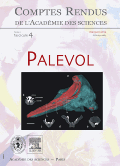
COMPTES RENDUS PALEVOL
Scope & Guideline
Where Past Meets Present in Earth Sciences
Introduction
Aims and Scopes
- Systematic Paleontology:
The journal publishes detailed systematic descriptions of fossils, exploring taxonomy and phylogenetic relationships across diverse groups, including mammals, reptiles, amphibians, and invertebrates. - Paleoecology and Biogeography:
Research often includes paleoecological studies that analyze the habitats and environmental conditions of past organisms, contributing to our understanding of biodiversity and distribution patterns through geological time. - Morphological and Functional Analysis:
A significant focus is placed on the morphology of fossil specimens, with studies examining functional adaptations and evolutionary trends within various taxa. - Methodological Innovations:
The journal also highlights innovative methodologies in paleontological research, including advanced imaging techniques, isotopic analysis, and taphonomic studies that enhance our understanding of fossil preservation and interpretation. - Interdisciplinary Approaches:
COMPTES RENDUS PALEVOL encourages interdisciplinary research, integrating paleontological data with archaeological, geological, and ecological perspectives to provide a broader context for findings.
Trending and Emerging
- Trace Fossils and Behavioral Paleontology:
There is a growing interest in trace fossils, particularly in understanding the behaviors of ancient organisms as evidenced by their burrowing and feeding activities. - Multidisciplinary Approaches:
Emerging themes include the integration of archaeological, genetic, and isotopic data to create comprehensive narratives of past ecosystems, showcasing the importance of interdisciplinary collaboration. - New Taxonomic Descriptions:
The journal has seen an uptick in new species and genus descriptions, particularly in previously underexplored regions, highlighting the ongoing discovery of biodiversity in the fossil record. - Technological Advances in Paleontology:
Advancements in imaging and analytical techniques are increasingly featured, allowing for deeper insights into fossil morphology and preservation, demonstrating the journal's commitment to methodological innovation. - Climate Change and Paleoecological Implications:
Research linking paleontological findings with climate change narratives is emerging, emphasizing the relevance of historical data in understanding current environmental challenges.
Declining or Waning
- Amphibian and Reptile Diversity Studies:
Recent years have seen fewer publications focusing specifically on amphibian and reptile diversity, perhaps indicating a shift towards more broadly applicable studies or a consolidation of findings in these areas. - Paleoanthropology:
Research related to human evolution and paleoanthropology has decreased, suggesting that the journal may be prioritizing more general paleontological studies over narrowly focused anthropological research. - Taphonomic Studies:
While still relevant, taphonomic studies appear less frequently, possibly due to a growing emphasis on integrative methodologies that combine taphonomy with other paleontological aspects. - Late Cretaceous Faunal Studies:
The focus on Late Cretaceous faunal studies has waned, which may reflect a saturation of findings or a shift towards earlier geological periods and their associated biodiversity.
Similar Journals
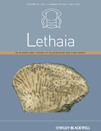
LETHAIA
Shaping the Future of Earth's Biological NarrativesLETHAIA, an esteemed journal published by Scandinavian University Press - Universitetsforlaget AS, serves as a vital platform for the dissemination of innovative research in the fields of paleontology as well as ecology, evolution, behavior, and systematics. Established in 1968 and continuing its impactful journey until 2024, LETHAIA has consistently contributed to advancing scientific understanding of Earth's biological and geological history. With a 2023 impact factor placing it in the Q2 category for both Paleontology and Ecology, Evolution, Behavior and Systematics, the journal is recognized for its high-quality, peer-reviewed articles that engage and challenge the academic community. Researchers, professionals, and students alike will find LETHAIA to be an indispensable resource for the latest findings, methodologies, and theoretical advancements in these interlinked disciplines.
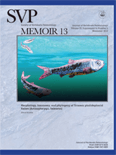
JOURNAL OF VERTEBRATE PALEONTOLOGY
Pioneering Discoveries in Vertebrate PaleontologyJOURNAL OF VERTEBRATE PALEONTOLOGY, published by Taylor & Francis Inc, is a premier academic journal dedicated to advancing the field of vertebrate paleontology. With a strong emphasis on both traditional and innovative research methods, this journal provides a platform for the dissemination of influential studies and discoveries that shape our understanding of vertebrate evolution and their ecological contexts. Operating under an ISSN of 0272-4634 and an E-ISSN of 1937-2809, it covers research published since 1981 and aims to foster a collaborative environment for researchers, professionals, and students alike. The journal is currently ranked in the Q2 category of Paleontology, standing at position #45 among 113 in its Scopus category, which underscores its significant contribution to the academic community. As a crucial resource for scholars, JOURNAL OF VERTEBRATE PALEONTOLOGY provides insights that not only enrich academic discourse but also stimulate further research and exploration in a field that bridges biology, geology, and conservation.
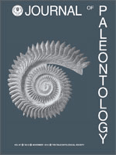
JOURNAL OF PALEONTOLOGY
Unearthing the Secrets of Ancient LifeJOURNAL OF PALEONTOLOGY, published by Cambridge University Press, is a leading scholarly journal dedicated to the field of paleontology, featuring a broad scope that covers fossil studies, evolutionary biology, and earth history. With an ISSN of 0022-3360 and an E-ISSN of 1937-2337, this esteemed journal serves as an essential platform for researchers, professionals, and students to disseminate cutting-edge research findings and insights in paleontological science. The journal holds a significant position within its category, ranking Q2 in the 2023 quartiles and achieving a Scopus rank of #51 out of 113 in Earth and Planetary Sciences – Paleontology, placing it in the 55th percentile of its field. Although it does not currently offer open access options, JOURNAL OF PALEONTOLOGY has been a critical contributor to advancing knowledge from its inception in 1979 through to 2024. Its dedication to rigorous research ensures it remains an indispensable resource for those vested in the understanding of ancient life and ecosystems.
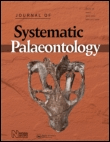
JOURNAL OF SYSTEMATIC PALAEONTOLOGY
Charting New Territories in Systematic PalaeontologyJOURNAL OF SYSTEMATIC PALAEONTOLOGY, published by Taylor & Francis Ltd in the United Kingdom, stands as a premier platform for advancing the discipline of palaeontology. With an ISSN of 1477-2019 and an E-ISSN of 1478-0941, this journal has achieved an impressive ranking of Q1 within its category for the 2023 Scopus metrics, underscoring its significance in the field. Currently ranked #10 out of 113 in Earth and Planetary Sciences – Paleontology with a remarkable 91st percentile, it serves as an essential resource for researchers, professionals, and students alike. The journal aims to publish cutting-edge research that fosters a deeper understanding of systematic palaeontology, including the evolutionary relationships and biodiversity of extinct organisms. While it operates under a traditional access model, the Journal’s expansive reach from its inception in 2003 through to 2024 ensures it continues to play a vital role in shaping the future of palaeontological studies.

Palaeobiodiversity and Palaeoenvironments
Charting the Evolution of Biodiversity and Ecosystems.Palaeobiodiversity and Palaeoenvironments, published by SPRINGER HEIDELBERG, is a distinguished academic journal that focuses on the intricate intersections of paleontology, ecology, and geology. With a strong commitment to advancing research in these fields, the journal maintains a notable impact factor and successfully ranks in the second quartile (Q2) in renowned categories including Ecology, Evolution, Behavior and Systematics, and Geology, providing significant visibility to contemporary research endeavors. Spanning a publication timeline from 2010 to 2024 and indexed under the respected Scopus database, it features a diverse array of articles that address the complexities of past biodiversity and ecosystems. Positioned within Germany's vibrant academic landscape, this journal appeals to a broad readership of researchers, professionals, and students who are eager to uncover the historical narratives of our planet’s life forms and their environments.
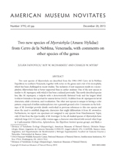
AMERICAN MUSEUM NOVITATES
Pioneering Research at the Intersection of Science and Culture.AMERICAN MUSEUM NOVITATES, published by the American Museum of Natural History, stands as a prestigious platform for scholarly dissemination in the fields of Archeology, History, and Museology. With an impressive impact factor evidenced by its Q1 rankings in 2023 across these categories, this journal is a vital resource for researchers and professionals seeking to advance knowledge and understanding within these disciplines. The journal's commitment to quality research is reflected in its high rankings within Scopus, where it boasts a remarkable rank of #37 in History and #4 in Museology, showcasing its relevance and influence in the academic community. While open access options are not currently available, readers can access compelling research articles that span from its inception in 2005 to the present date, making it an essential reference for those interested in the historical and cultural implications of natural history and museum studies. Located in the heart of New York, this journal fosters a collaboration between scientists and scholars, enriching both academic and public understanding of our shared heritage.

NAUTILUS
Where Aquatic Science Meets Scholarly ExcellenceNAUTILUS is a distinguished journal published by the Bailey-Matthews Shell Museum, dedicated to advancing the understanding of aquatic sciences as well as ecology, evolution, behavior, and systematics. With an ISSN of 0028-1344, NAUTILUS has played a significant role in the scholarly community from its inception, with publication converged between 1996 to 2015 and 2017 to 2024. Although currently categorized as Q4 in Aquatic Science and Ecology, Evolution, Behavior and Systematics for 2023, the journal has a reputation for publishing high-quality research that contributes to the broader scientific discourse. Researchers and students alike can benefit from the insights provided by NAUTILUS, which remains committed to exploring the intricate relationships within aquatic ecosystems. Its editorial management, led by Dr. José H. Leal, ensures rigorous peer review and academic excellence, making it a crucial resource for those dedicated to discovering the complexities of aquatic and ecological research.
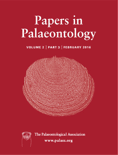
Papers in Palaeontology
Unveiling the Secrets of Our Planet's PastPapers in Palaeontology, published by WILEY, is a premier academic journal dedicated to advancing the field of paleontology. With an admirable impact factor and positioned within the Q1 category in Paleontology for 2023, this journal has established itself as a leading platform for innovative research and discussion, ranking 17th out of 113 in Scopus’s Earth and Planetary Sciences category. Since its inception in 2015, Papers in Palaeontology has aimed to publish high-quality, peer-reviewed articles that explore the diversity of ancient life forms and their evolutionary history. Researchers, professionals, and students alike will find valuable insights and rigorous analyses that contribute to the understanding of our planet’s past. Although Open Access options are not available, the journal provides a wealth of knowledge essential for anyone engaged in the study or practice of paleontology, solidifying its importance in shaping future academic discourse.
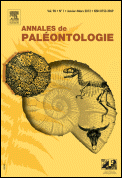
ANNALES DE PALEONTOLOGIE
Pioneering Studies in Earth and Planetary SciencesANNALES DE PALEONTOLOGIE is a distinguished academic journal published by MASSON EDITEUR that plays a pivotal role in the field of paleontology. With an ISSN of 0753-3969 and an E-ISSN of 1778-3666, this journal has been a vital resource since its inception in 1988, continuously contributing to the advancement of knowledge in Earth and Planetary Sciences, particularly focusing on paleontological research. Currently ranked #68 out of 113 in its category by Scopus, and celebrated for its Q2 quartile standing, ANNALES DE PALEONTOLOGIE publishes innovative studies, reviews, and discussions that appeal to a diverse audience of researchers, professionals, and students. The journal aims to foster a deeper understanding of paleontological phenomena and encourages interdisciplinary collaboration within the scientific community. Although it is not an open access journal, its commitment to scholarly excellence ensures that the content is highly regarded and widely referenced in academic circles. Situated in Issy-les-Moulineaux, France, it continues to maintain a global readership while promoting significant advancements in paleontological research.

RIVISTA ITALIANA DI PALEONTOLOGIA E STRATIGRAFIA
Empowering Scholars with Open Access to Earth ScienceRIVISTA ITALIANA DI PALEONTOLOGIA E STRATIGRAFIA, published by Università degli Studi di Milano, is a leading open access journal dedicated to the fields of Paleontology, Geology, and Stratigraphy. Established in 1979, this prestigious journal fosters the dissemination of high-quality research and innovative studies within these disciplines, holding a commendable Q2 ranking in Geology, Paleontology, and Stratigraphy as of 2023. The journal’s commitment to accessibility since 2016 underlines its objective to promote the sharing of knowledge among researchers, professionals, and students alike. With its notable Scopus rankings reflecting a solid performance in the Earth and Planetary Sciences, particularly in Paleontology and Stratigraphy, RIVISTA ITALIANA serves as a vital resource for those seeking to stay informed on the latest advancements and discoveries within the geological sciences. For further inquiries, the editorial office is located at C/O RIVISTA ITALIANA PALEONTOLOGIA STRATIGRAFIA, VIA MANGIAGALLI, 34, 20133 MILANO, ITALY.